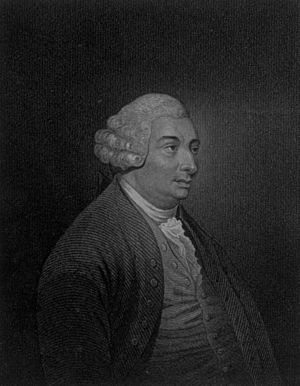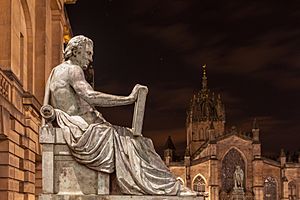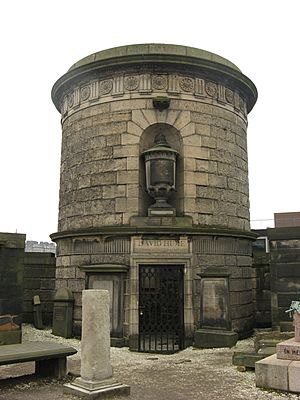David Hume facts for kids
Quick facts for kids
David Hume
|
|
|---|---|
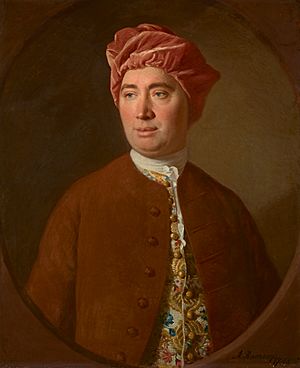
David Hume by Allan Ramsay, 1754
|
|
| Born |
David Home
7 May NS [26 April OS] 1711 Edinburgh, Scotland
|
| Died | 25 August 1776 (aged 65) Edinburgh, Scotland
|
| Education | University of Edinburgh |
| Era | 18th-century philosophy |
| Region | Western philosophy |
| School |
|
|
Main interests
|
|
|
Notable ideas
|
List
|
|
Influenced
|
|
David Hume (pronounced "hyoom") was an important Scottish thinker. He was a philosopher, historian, and economist. He lived in the 1700s, a time known as the Scottish Enlightenment.
Hume's ideas about religion were quite new and sometimes caused arguments. For example, he questioned whether miracles really happened. He also doubted the idea that God's existence could be proven by looking at the design of the world.
Contents
David Hume's Early Life
David Hume was born in Edinburgh, Scotland, on April 26, 1711. His birth name was David Home. He was one of two sons. His father passed away when David was only two years old. His mother raised him and his siblings by herself.
In 1734, David changed the spelling of his last name to 'Hume'. This was because 'Home' was not well-known in England, and people often mispronounced it.
Hume went to the University of Edinburgh at a very young age. He was either 10 or 12 years old, much younger than the usual age of 14. He did not complete his degree there.
David Hume's Career Path
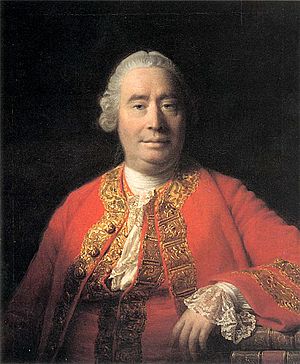
When he was 25, Hume did not have a job or a way to earn money. He decided to become a merchant's assistant. This meant he had to leave Scotland. He traveled to France, where he met with scholars.
Hume tried to get a job as a university professor. However, his ideas were seen as too controversial. Some people even accused him of not believing in God.
He spent four years writing his first big book, A Treatise of Human Nature. He finished it in 1738 when he was 28. Later, he became a successful writer of essays. He also got a job as a librarian at the University of Edinburgh. This job gave him access to many books and helped him write his huge six-volume work, The History of England. This history book became very popular. It made Hume a rich man, so he no longer needed to work for others.
David Hume's Later Years
From 1763 to 1765, Hume worked in Paris, France. He was a secretary at the British embassy there. This meant he helped the British ambassador with important tasks.
In 1765, he became the British Chargé d'affaires. This role meant he was in charge of the embassy when the ambassador was away. He wrote important messages to the British government.
In 1767, Hume became an Under Secretary of State. He said he learned "all the secrets of the Kingdom" in this job. In 1769, he returned to Edinburgh. He lived there until he passed away in 1776.
David Hume's Death
David Hume died on August 25, 1776, from a type of stomach cancer. He wanted a simple tomb with only his name and the years he was born and died. He left it "to Posterity to add the Rest."
His tomb is in the Old Calton Burial Ground in Edinburgh.
Hume's Ideas on the Mind
One of Hume's main ideas is that our minds are made of "perceptions." He divided these into two types: impressions and ideas.
- Impressions are strong and vivid. For example, the feeling of touching a hot pan is an impression.
- Ideas are fainter copies of impressions. Thinking about touching a hot pan is an idea.
Hume believed that all our ideas come from our experiences. He argued that we are not born with any "innate ideas." He also famously said that our feelings and desires, not just our logical thoughts, control how we act. He believed that "Reason is, and ought only to be the slave of the passions."
Hume on Miracles
Hume argued that we should not believe in miracles. He thought they do not prove that God exists. Here are some of his reasons:
- People sometimes lie about miracles for fame or to help their religion.
- People enjoy telling stories about miracles, even if they are not true.
- Miracles seem to happen more often in less developed societies. They are less common in modern, educated societies.
- Each religion's miracles argue against the miracles of other religions. This makes all of them less likely to be true.
Hume's Political Ideas
Hume is seen as one of the first thinkers of conservatism. This is a political idea that values tradition and stability.
He wrote about his ideal society in an essay called "Idea of a Perfect Commonwealth." He believed the best government should have:
- A strict separation of powers. This means different parts of the government have different jobs.
- Decentralization. This means power is spread out, not held by one central group.
- The right to vote for anyone who owned valuable property.
- Limited power for religious leaders.
- A citizen army, like the Swiss militia, for protection.
- Annual elections for representatives who would not be paid.
Hume's Economic Ideas
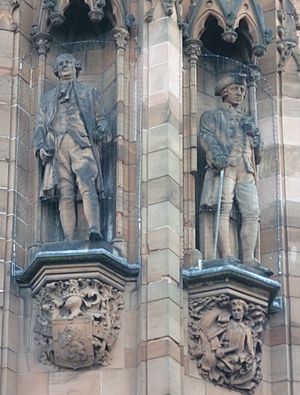
Hume introduced several new ideas that shaped "classical economics" in the 1700s. These included ideas about private property, inflation, and foreign trade.
Hume thought that private property is not a natural right. Instead, he believed it is necessary because resources are limited. If everything was unlimited, private property would not be needed. He also believed that property should not be perfectly equal. He thought that perfect equality would stop people from working hard and saving. This would make everyone poorer.
David Hume also had ideas about money. He understood the difference between the nominal value of money (the number on a coin) and its real value (what it can buy). He showed that a country does not need a specific amount of money to be successful.
David Hume's Legacy
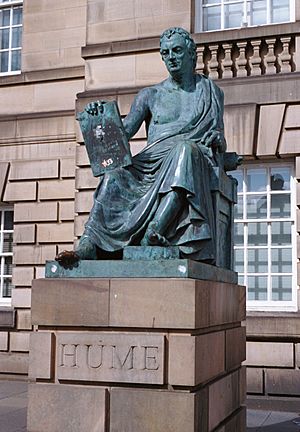
Hume had a huge impact on later philosophy. Many modern ideas in philosophy and cognitive science are called "Humean."
The famous German philosopher Immanuel Kant said that Hume's ideas "awakened him from his dogmatic slumber." This means Hume made Kant think in new ways.
Interesting Facts About David Hume
- Around age 18, Hume planned to spend at least 10 years reading and writing. He almost had a mental breakdown. A doctor even diagnosed him with the "Disease of the Learned."
- Hume never married. He lived partly at his family home in Scotland.
- He didn't think much of professors in his time. He once told a friend that you could learn everything from books.
- Hume thought his later books, An Enquiry Concerning Human Understanding and An Enquiry Concerning the Principles of Morals, were his best works. He wanted people to judge him based on these books.
- His first major work, A Treatise of Human Nature, is now seen as one of the most important books in Western philosophy. But when it was published, people found it "abstract and unintelligible."
- Near the end of his life, Hume wrote a very short autobiography called "My Own Life." It was less than 5 pages long.
- Hume was a large man and loved good wine and cheese.
- In the 1770s, Hume disagreed with British policies towards the American colonies. He supported American independence.
- Albert Einstein said in 1915 that Hume's ideas helped him develop his theory of special relativity.
- Hume's nephew, also named David Hume, was a co-founder of the Royal Society of Edinburgh. He became a professor and a judge. He is buried with his uncle.
Important Works by David Hume
- 1739–1740. A Treatise of Human Nature: This was Hume's first major work. He hoped it would be a success, but it was not popular at first.
- 1748. An Enquiry Concerning Human Understanding: This book reworked some of the main ideas from his Treatise in a clearer way. It included his famous section on miracles.
- 1751. An Enquiry Concerning the Principles of Morals: Hume thought this was his best writing. It discussed his ideas about morality.
- 1754–1762. The History of England: This multi-volume history book covered English history from Julius Caesar to 1688. It was very popular and became a standard history book for many years.
- 1779. Dialogues Concerning Natural Religion: This book was published after Hume's death. It is a discussion among three characters about the nature of God.
See also
In Spanish: David Hume para niños
 | Claudette Colvin |
 | Myrlie Evers-Williams |
 | Alberta Odell Jones |


